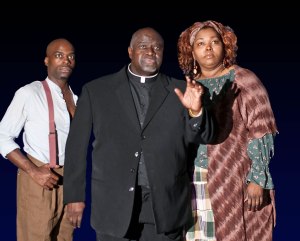In his 1949 Broadway opening-night review of Kurt Weill’s Lost in the Stars, New York Times critic Brooks Atkinson commented: “Mr. Weill has given the theater some fine scores, but… it is difficult to remember anything out of his portfolio as eloquent as this richly orchestrated singing music… overflowing with the same compassion that Mr. Paton brought to his novel…. The music is deep, dramatic, and beautiful.” In Theatre Three’s current production of Lost in the Stars, set main stage in the round at the Quadrangle, the entire ensemble struggles on occasion to master the near operatic challenge the complex score presents. No matter. The soaring eloquence of the music and its sincere expression of the collective human soul’s heart-felt desire for universal acceptance and transcendence allow Theatre Three’s talented, diverse acting ensemble to reach a superb performance level in spite of any vocal technique shortcomings. Their rawness adds veracity to the score’s richness and contemporary potency to the production. The audience exults in the hauntingly expressive music, while treading every anguished step alongside the main character Stephen Kumalo in his Orpheus-like descent to Hell and back. It’s transformative, enriching theatre in an accessible modern vernacular.
Talk about hope-filled audacity. Some vision composer Kurt Weill and lyricist Maxwell Anderson must have had in 1949 to create and mount a musical stage adaptation of Alan Paton’s disturbingly realistic 1948 apartheid novel Cry, the Beloved Country. What musical swept the Tony awards in 1949? Cole Porter’s Kiss Me Kate, hardly in the same league as far as provocative social commentary goes. How could Weill/Anderson have expected their show to go on tour in 1949? Where could they have fed and housed a bi-racial cast in segregated America, the land of separate but equal drinking fountains, hotels and restaurants? What race-related roadblocks must they have faced even in mounting the show in the “enlightened” New York of that day? And where at that time would they find a substantial number of African-American singers versed in operatic-dimensioned expression to fully realize the major roles? Weill must have planned carefully. As his lead Stephen Kumalo, he cast the incomparable operatic baritone and actor Todd Duncan, the first African-American to sing with a major opera company (1945), and the first black person to sing in an opera with an otherwise white cast (the New York City Opera). Duncan was quite the outspoken desegregation advocate. While playing Porgy in Gershwin’s Porgy and Bess during the show’s 1936 Washington run at the National Theatre, he led the cast in a protest of the theatre’s policy of segregation. Duncan declared that he “would never play in a theater which barred him from purchasing tickets to certain seats because of his race.” Management succumbed to his demands and allowed the first integrated performance at the National Theatre. No one on earth could have better brought the plight of Stephen Kumalo to life both vocally and experientially for that first production. Todd Duncan had walked that walk, fought that battle, himself.
How does a modern company cast that pivotal role? Theatre Three features multiple award-winning Akin Babatunde as Stephen Kumalo. Babatunde brings phenomenal stage presence, reverential compassion and ferocious dignity to his portrayal. Trained at the National Black Theatre in Harlem, he has acted, directed, coached and taught extensively nation-wide and abroad. His co-written play Blind Lemon Blues, has earned national acclaim, with his performance as Blind lemon receiving glowing praise. Accordingly, he brings a gravelly blues sensibility to his song interpretations that makes Kumalo a vivid Everyman dealing with life’s unspeakable horrors. This musical isn’t mounted very often, possibly because it’s hard to cast. With Babatunde as lead, Theatre Three not only bypasses the inherent casting challenge, it transforms the show to reach today’s audience head on. Could Theatre Three have found a stronger African-American operatic singer for the Kumalo role today? Undoubtedly. Would he have brought the show as effectively to life in the era of “Yes, We Can” as Babatunde with his soulful blues intonations and common man demeanor? Probably not.
The rest of the ensemble creates unforgettable, transformational moments as well. Liz Mikel’s raunchy fun “Who’ll Buy” kicks Act I into high gear, while her stirring, heartfelt rendition of “Cry, the Beloved Country” in Act II warrants an extended encore. TeCo Theatrical Productions’ trained young artist Raliegh “Tre” Jones delights the audience in his cameo solo “Big Mole”. The tragic role of Stephen Kumalo’s son Absolom seems tailor-made for Dallas Theater Center resident actor/singer Cedric Neal. His soaring rendition of “The Wild Justice “ in Act II expresses such vivid contrast in bright and dark tones that it shines a poignant light on the relentless determination of his father Stephen Kumalo to find resolution and salvation as much as it reveals his character’s inner conflict. Neal’s Absolom never begs for mercy; his honesty brings on his death while providing redemptive inspiration for all lives he touches. The father’s single-minded dignity is mirrored in the son, although their life paths carry them far apart. Through Absolom’s committed resolve the audience, along with Stephen Kumalo, is no longer “lost in the stars.” Through Weill’s music all are transported to that grace-filled magical place.
Lost in the Stars, dealing with the most serious subject matter of any show currently running in the region, delivers its message of reconciliation through loss with a powerful musical wallop. It matches our times of hope and challenge, warrants attendance by all who believe that great theater can inspire transformation as well as provide exquisite entertainment.
Theatre Three’s production of Kurt Weill’s Lost in the Stars runs through June 14.
Tickets: 214.871.3300 (p)
option #1: box office
option #2: administration
option #3: direct sales
ADMIN: admin@theatre3dallas.com
BOX OFFICE: boxoffice@theatre3dallas.com
Theatre Three, Inc.
2800 Routh Street, #168
Dallas, TX 75201
www.theatre3dallas.com





